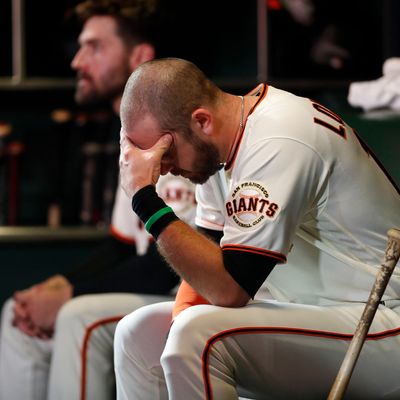
This year, the San Francisco Giants won 107 games, tying them for the third most wins of any team this century and the 13th most of any team in the history of Major League Baseball. The team’s reward for this historic (and very much unexpected) season was an immediate matchup against the Los Angeles Dodgers, themselves the winners of 106 games. The Dodgers won the five-game series between the two nearly evenly matched teams, advancing to the National League Championship Series to play the 88-win Atlanta Braves.
In no rational universe should the Dodgers and Giants have played each other in the Division Series. This unfortunate matchup was the result of baseball’s ill-considered playoff format, which pits the team with the best record in its league against the winner of the Wild Card Game regardless of the latter team’s record. The format, in use since 2012, is designed to boost the appeal of a division title by making the alternative path through the playoffs more difficult. A Wild Card team, which previously enjoyed equal footing with the three division winners, must now survive a one-game playoff, often using its best pitcher before the Division Series even begins. If it makes it through, it faces the best team in its league.
Baseball has tinkered with the playoff format since introducing the Wild Card more than two decades ago, but no bracket fixed at the start of the postseason can guarantee fair Division Series matchups. And while seeding teams based on their record after the Wild Card Game would pair them better, there’s a much more fun way to do this: Let the teams themselves choose their Division Series opponents.
We almost got a taste of this chaos in early October. Among the many scenarios that could have played out at the end of the regular season but didn’t, one was especially delicious: a four-way tie for the two American League Wild Card spots, in which the teams would get to pick their seeds for the tiebreaker games. Under the rules, the Red Sox and Blue Jays would have been able to choose seeds that let them host their respective games. But the Yankees, in the third position among the four teams, would then have gotten to choose which of those two teams they would play. This rather revolutionary concept is right there in the MLB rule book, if only for a specific, unlikely scenario.
Sports are traditionally constrained by predetermined schedules, brackets, and perhaps the occasional playoff reseeding, but teams are given no agency in the process. They simply play where they’re told. But giving two teams in each league a chance to pick whom they play solves all sorts of problems. It rewards the division winner with the best record, granting it the first pick for an opponent. It emphasizes finishing first in a division with multiple playoff teams since the coin flip of a Wild Card Game remains a scary thing. And it eliminates the scenario we just saw, in which the two best teams met early in the playoffs (unless the best team wants it that way, which seems unlikely). It also creates a system in which a team’s strength isn’t strictly defined by a number in the standings. A club considering whom it wants to face might factor in a potential opponent’s overall health, the status of its ace pitcher, the depth of its rotation, whether it’s on a hot streak, and their head-to-head matchups during the regular season. This adds a whole new layer of strategy to the playoffs — different from anything managers and front offices have had to consider before.
Plus it’s the format with the most potential to spark debate — and bad blood. The Yankees decided, in the event of a tiebreaker game this season, that they would rather have played Boston than Toronto. Imagine the unhinged WFAN calls if the Yankees lost that game (a likely scenario!) after actively choosing to play their arch-rival. Imagine the amount of bulletin-board material generated for the team deemed the inferior opponent, not to mention the increased pressure for any higher seed to win lest it look foolish for ending its season choose-your-own-adventure–style.
And beyond all that, there’s another big advantage here for Major League Baseball, which finds itself under attack from its core fans on a consistent basis: The next time a fan base doesn’t like its team’s Division Series matchup, it would have someone other than the league to blame. What’s not to like?





























